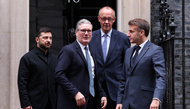▶ ROGER COHEN
With the end of the Cold War division of Europe now a quarter-century distant, and the old strategic imperatives of trans-Atlantic cohesion long gone, much is made of the shared values of Europe and the United States as the glue that binds them. But in the case of Germany this argument no longer holds. If anything, a cultural gulf has emerged.
The clash of three traumas — the Nazis and then the Stasi in Germany, and 9/11 in the United States — has left each society with a different appreciation of the relative value of privacy and personal freedom on the one hand and security on the other. Or at least that is the way they perceive each other. Few things summon the nightmarish past in Germany quite like revelations that their personal data and chat is being vacuumed up. Get over it, say Americans, a chief 9/11 plotter lived in Hamburg. Being a world power and a regional power are not the same.
A leaked conversation in which Victoria Nuland, the top American diplomat for Europe, used the f-word to sum up her sentiments about the European Union and its efforts at diplomacy in Ukraine infuriated Chancellor Angela Merkel, who through her spokesman called the remarks “absolutely unacceptable.” Merkel still feels angry, betrayed and humiliated by the National Security Agency’s eavesdropping on her cellphone. She recently told one politician close to her that she misses George W. Bush.
The relationship between Europe’s most powerful leader and President Obama is strained. It got off to a bad start and never recovered. Obama was not pleased that Merkel refused his request to speak at Berlin’s Brandenburg Gate when he was candidate in 2008; Merkel thought the idea hubristic, Obama was not yet president after all.
She hates soaring rhetoric and feels Obama over-promises and under-delivers (Guantánamo, climate change, nuclear Global Zero). Obama has qualms of his own: the German opt-out on Libya and austerity-driven recipes for the European Union. This, in any event, is the first postwar American president for whom trans-Atlantic sentiments are more duty-bound than heartfelt. The so-called United States pivot to Asia reflected shifting power but also personal inclination.
Now, perhaps all this is not so bad. For decades, Germany was America’s problem. The postwar republic emerged under American tutelage. As that parental relationship ended, there were bound to be difficulties. This is the best Germany there has ever been, prosperous and at peace with its neighbors. One senior official told me: “It’s O.K. not to be the problem any longer. But how can we be problem-solvers together?”
The question is hanging there as an ever-stronger Germany reconsiders its foreign policy and appraises the lingering surveillance-scandal damage. The first weeks of Merkel’s new government have seen a marked rhetorical shift away from restraint. Joachim Gauck, the German president, has lambasted those “who use Germany’s guilt for its past as a shield for laziness or a desire to disengage from the world.” He has said the time for distrust is past; it is now a time for greater German responsibility.
Frank-Walter Steinmeier, the foreign minister, who is in Moscow this week, has also inveighed against a culture of sitting on the sidelines. A sweeping review of foreign policy involving town hall debates and online forums is underway. As always in Germany the balance between assertiveness and meekness is delicate. But the pendulum has swung toward a Germany that holds back less.
How these words translate into action remains to be seen. The dispatch of a few German soldiers to Africa, help in the disposal of Syrian chemical weapons, a reinvigorated German-French relationship, and Steinmeier’s Putin diplomacy on Ukraine are initial signs. There will be more.
It is unquestionably in America’s interest to work closely with Germany as this needed adjustment unfolds. For that, a way past the current estrangement has to be found. Steinmeier has warned that the loss of trust, particularly among young Germans, “will not heal by itself.” He has proposed a trans-Atlantic forum to address the question of how fundamental civil rights are maintained in the era of big data. He has said the young generation of Germans needs to be won over anew to the trans-Atlantic bond.
Steinmeier is right about all this. But despite talk from Secretary of State John Kerry of a trans-Atlantic “renaissance,” the response from Washington has been frustrating to Germany. One Obama interview with German TV did not cut it. The wound has been underestimated. A bon mot in Germany has it that Americans no longer listen, they merely listen in.
스마터리빙
more [ 건강]
[ 건강]이제 혈관 건강도 챙기자!
[현대해운]우리 눈에 보이지 않기 때문에 혈관 건강을 챙기는 것은 결코 쉽지 않은데요. 여러분은 혈관 건강을 유지하기 위해 어떤 노력을 하시나요?
 [ 건강]
[ 건강]내 몸이 건강해지는 과일궁합
 [ 라이프]
[ 라이프]벌레야 물럿거라! 천연 해충제 만들기
 [ 건강]
[ 건강]혈압 낮추는데 좋은 식품
[현대해운]혈관 건강은 주로 노화가 진행되면서 지켜야 할 문제라고 인식되어 왔습니다. 최근 생활 패턴과 식생활의 변화로 혈관의 노화 진행이 빨라지고
사람·사람들
more많이 본 기사
- 초강경 추방 드라이브… 한인사회 불안… 3
- 트럼프 경제·이민 정책 지지율 급락 1
- 노화의 신호, 흰머리는 왜 생기나… … 1
- 돌고래는 탐색, 범고래는 사냥…연어잡이에 놀라운 전략적 동맹
- “말이 참 기십니다”…李대통령, ‘尹임명’ 인천공항사장 폭풍질타
- 소셜연금 NY 2,018달러·NJ 2,190달러
- ‘트럼프 골드카드’ 신청 시작 100만달러 내면 미 영주권
- 부채증가 세계 최고… “상실감 위로한다며 1인당 60만원”
- ‘오락가락’ 진술 윤영호…경찰 수사 첫 스텝부터 꼬이나
- 김하성-ATL, 이대로 헤어지나→윈터미팅서만 무려 1005억 지출해버렸다
- ‘강등’ 검사장 정유미, 인사취소 소송… “인사껍질만 쓴 중징계”
- ‘나혼산’ 박나래, 흔적도 없이 하차..전현무→기안84 ‘어두운 낯빛’ 패싱 진행
- 감찰 요구에도 수사기록 공개한 백해룡…검찰 “외부유출 심각”
- ‘테라 사태’ 권도형 징역 15년 1
- 美 레전드 깜짝 전망 “한국, 북중미 월드컵 A조 1위로 32강”
- 워싱턴 산악인, 스톤마운틴 정상에 서다
- 재외투표율 79.5%… 투표자 수 미… 2
- 한국 교사 10명, 페어팩스 초등교 배치
- 무단 주차 견인료 150불⇨ 210불
- ‘정국 열애설’에 뿔난 아미 ‘워워’..BTS 완전체, 전역→웃으며 연습실 회동 첫 인증샷
- DUI 차량, 애나하임 고교생 8명 덮쳐
- 김지민 “유부남과 불륜, 날 알리바이로 이용”..친구와 손절한 사연 [이호선의 사이다]
- ‘오바마케어 보조금’ 올해 말 종료 가능성 ↑ 커져
- 정준호 얼굴 훔쳐 가짜 광고..소속사 “악의적 행위, 법적 대응”
- VA 청정에너지 사업 재개되나
- 서재홍 씨, 동중부한인연합회장 출마
- 글로벌어린이재단 VA 지부, 2.20 클럽에 2,000달러 기부
- 한인 업소들, 이번 주말 ‘할인 대전’ 돌입
- 한양대 메릴랜드 동문회 20일 송년파티
- 노벨상 마차도 “마두로 결국 몰락할 것…질서있는 전환에 집중”
- 김민선 학장 자선행사서 40만달러 기금조성
- [인터뷰] “한인 커뮤니티 지원하고 도움이 되는 협회될 것”
- “이스라엘, 美 압박에 가자지구 재건 비용 부담키로”
- 월남전 참전지회 워싱턴지회 18일 송년 행사
- 경기고 56회 동창회, 더나눔하우스에 후원금 전달
- 민주당서 크레젤·대넌 2명 출마
- 임소정씨, VA 주하원의원 도전
- “마약밀매·인신매매 등 국제범죄 척결” ‘국토안보 태스크포스’ 뉴욕지부 출범
- 글로벌어린이재단 연말모임
- 파워볼 잭팟 10억 달러 13일 토요일 추첨
- 시화집‘이별없는 사랑’ 발간
- 검문 뚫고 목선 탈출… 마차도 ‘목숨 건’ 노벨평화상 참석
- 이번 주말 ‘송년모임 대축제’… 단체·동문회 행사 절정
- 송미숙 전 이사장 단독 출마
- MD한인회장 또‘무후보’
- “박나래 前매니저 5000만원 지급? 과한 수당 요구” 주장
- 13일 추첨 파워볼 열풍 잭팟 10억달러 돌파
- 김찬수씨, 포토맥 포럼에 2천달러 기부
- 자녀들과 함께 세우는 부모님 자산 이전 계획
- 전도연 “얼굴 근육 가장 많이 써…자백의 대가 이리 클 줄은”
1/5지식톡

-
 테슬라 자동차 시트커버 장착
0
테슬라 자동차 시트커버 장착
0테슬라 시트커버, 사놓고 아직 못 씌우셨죠?장착이 생각보다 쉽지 않습니다.20년 경력 전문가에게 맡기세요 — 깔끔하고 딱 맞게 장착해드립니다!장착비용:앞좌석: $40뒷좌석: $60앞·뒷좌석 …
-
 식당용 부탄가스
0
식당용 부탄가스
0식당용 부탄가스 홀세일 합니다 로스앤젤레스 다운타운 픽업 가능 안녕 하세요?강아지 & 고양이 모든 애완동물 / 반려동물 식품 & 모든 애완동물/반려동물 관련 제품들 전문적으로 홀세일/취급하는 회사 입니다 100% …
-
 ACSL 국제 컴퓨터 과학 대회, …
0
ACSL 국제 컴퓨터 과학 대회, …
0웹사이트 : www.eduspot.co.kr 카카오톡 상담하기 : https://pf.kakao.com/_BEQWxb블로그 : https://blog.naver.com/eduspotmain안녕하세요, 에듀스팟입니다…
-
 바디프렌드 안마의자 창고 리퍼브 세…
0
바디프렌드 안마의자 창고 리퍼브 세…
0거의 새제품급 리퍼브 안마의자 대방출 한다고 합니다!8월 23일(토)…24일(일) 단 이틀!특가 판매가Famille: $500 ~ $1,000Falcon: $1,500 ~ $2,500픽업 & 배송직접 픽업 가능LA…
-
 바디프렌드 안마의자 창고 리퍼브 세…
0
바디프렌드 안마의자 창고 리퍼브 세…
0거의 새제품급 리퍼브 안마의자 대방출 한다고 합니다!8월 23일(토)…24일(일) 단 이틀!특가 판매가Famille: $500 ~ $1,000Falcon: $1,500 ~ $2,500픽업 & 배송직접 픽업 가능LA…
케이타운 1번가
오피니언

22기 LA평통 출범에 거는 기대

연말 시즌 사기·범죄 경계해야
 메건 매카들 워싱턴포스트 칼럼니스트
메건 매카들 워싱턴포스트 칼럼니스트 [메건 매카들 칼럼] 장편영화의 마지막 챕터인가
 김미선 서북미문인협회 회장시인
김미선 서북미문인협회 회장시인 [한국춘추] 하늘을 계산한 사람들, 칠정산
 이희숙 시인·수필가
이희숙 시인·수필가 [금요단상] 그을린 자리에서 다시
 심상용 / 서울대 미술관장
심상용 / 서울대 미술관장 [미술 다시보기] 지옥에 대하여
 서정명 / 서울경제 기자
서정명 / 서울경제 기자[만화경] 주한미군과 ‘도련선 리스크’
 한 영 재미수필가협회 회장
한 영 재미수필가협회 회장 [한영의 독서칼럼] 불안한 사람들
 정영현 서울경제 테크성장부장
정영현 서울경제 테크성장부장 [여명] 콘크리트가 데이터가 됐을 뿐, 달라진 게 없다
1/3지사별 뉴스

“마약밀매·인신매매 등 국제범죄 척결” ‘국토안보 태스크포스’ 뉴욕지부 출범
연방 국토안보부가 10일 ‘국토안보 태스크포스’(HSTF) 뉴욕지부를 출범시켰다.HSTF는 마약 카르텔, 인신매매, 자금세탁, 갱단 등 국제범…
‘오바마케어 보조금’ 올해 말 종료 가능성 ↑ 커져

한국 교사 10명, 페어팩스 초등교 배치
‘글로벌 앰버서더 티처스 프로그램’(Global Ambassador Teachers Program)은 국제 교사 교환 프로그램 가운데 하나로 …
김찬수씨, 포토맥 포럼에 2천달러 기부

초강경 추방 드라이브… 한인사회 불안감 확산
도널드 트럼프 행정부가 출범 직후 불법체류자 100만 명 추방 목표 달성을 위해 초강경 조치를 본격화하면서 미주 한인사회에 불안감이 심각하게 …
SV 한인대상 시상식

오늘 하루 이 창 열지 않음 닫기 





















































.png)


댓글 안에 당신의 성숙함도 담아 주세요.
'오늘의 한마디'는 기사에 대하여 자신의 생각을 말하고 남의 생각을 들으며 서로 다양한 의견을 나누는 공간입니다. 그러나 간혹 불건전한 내용을 올리시는 분들이 계셔서 건전한 인터넷문화 정착을 위해 아래와 같은 운영원칙을 적용합니다.
자체 모니터링을 통해 아래에 해당하는 내용이 포함된 댓글이 발견되면 예고없이 삭제 조치를 하겠습니다.
불건전한 댓글을 올리거나, 이름에 비속어 및 상대방의 불쾌감을 주는 단어를 사용, 유명인 또는 특정 일반인을 사칭하는 경우 이용에 대한 차단 제재를 받을 수 있습니다. 차단될 경우, 일주일간 댓글을 달수 없게 됩니다.
명예훼손, 개인정보 유출, 욕설 등 법률에 위반되는 댓글은 관계 법령에 의거 민형사상 처벌을 받을 수 있으니 이용에 주의를 부탁드립니다.
Close
x